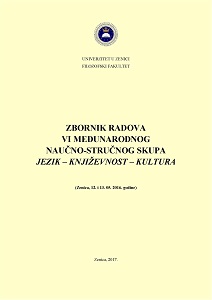PRINCIPIJELNI EKLEKTICIZAM U NASTAVI ENGLESKOG JEZIKA
PRINCIPLED ECLECTICISM IN ENGLISH LANGUAGE TEACHING
Author(s): Nebojša Vasić
Subject(s): Language and Literature Studies, Education, Foreign languages learning, Applied Linguistics
Published by: Filozofski fakultet, Univerzitet u Zenici
Keywords: traditional teaching; modern teaching; principled eclecticism; holistic access; the third way
Summary/Abstract: Principled eclecticism entails a holistic approach to teaching English which avoids pronounced contrast between traditional and modern educational paradigm. Eclecticism tends to connect seemingly antagonistic principles, methods and guidelines for the teaching of English language in order to find optimal solutions in the specific context. Traditional education is primarily focused on teachers and the process of teaching, while the modern trends are more oriented towards students and the process of learning. Principled eclecticism finds its focus in the quality teaching that is flexible and dynamic; namely traditional dichotomy is rejected as an incomplete educational concept. The meaning of the principled eclecticism is in the permeation and search for "the third way", rather than in emphasizing one or the other of opposing positions. Irreconcilable antagonism does not leave enough room for a complementary solution which is not merely mechanical addition but much more creative approach to teaching English that primarily takes into account the specific attributes of the particular context as the basis for more effective approach compared to the traditional extreme positions. Principled eclecticism requires unstoppable revisions and experimentation, and above all rejection of the dogmatic solutions that do not take into account the importance of the real context.
Book: ZBORNIK RADOVA VI MEĐUNARODNOG NAUČNO-STRUČNOG SKUPA "JEZIK – KNJIŽEVNOST – KULTURA"
- Page Range: 13-19
- Page Count: 7
- Publication Year: 2017
- Language: Bosnian
- Content File-PDF

